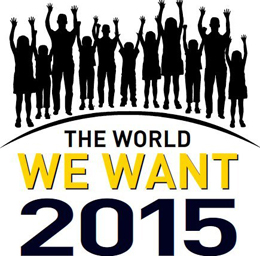The Permanent Missions of Canada and Senegal, which are supporting the Thematic Consultation on Education in the Post-2015 Development Agenda, held a briefing on the Consultation on 5 March 2013, at the Office of the Permanent Observer of the African Union (AU), in New York, US.
The UN Educational, Scientific and Cultural Organization (UNESCO) and the UN Children's Fund (UNICEF), UN co-leaders for the consultation, also participated in the briefing.
 5 March 2012: The Permanent Missions of Canada and Senegal, which are supporting the Thematic Consultation on Education in the Post-2015 Development Agenda, held a briefing on the Consultation on 5 March 2013, at the Office of the Permanent Observer of the African Union (AU), in New York, US. The UN Educational, Scientific and Cultural Organization (UNESCO) and the UN Children’s Fund (UNICEF), UN co-leaders for the consultation, also participated in the briefing.
5 March 2012: The Permanent Missions of Canada and Senegal, which are supporting the Thematic Consultation on Education in the Post-2015 Development Agenda, held a briefing on the Consultation on 5 March 2013, at the Office of the Permanent Observer of the African Union (AU), in New York, US. The UN Educational, Scientific and Cultural Organization (UNESCO) and the UN Children’s Fund (UNICEF), UN co-leaders for the consultation, also participated in the briefing.
Guillermo Rishchynski, Permanent Representative of Canada, highlighted the importance of basic education as a foundation for lifelong learning and employment, and as a main driver in reducing poverty and fostering sustainable development. He said Canada has identified children and youth as one of five thematic priorities for international assistance. He added that the ongoing thematic consultation provides an ideal opportunity to build on lessons learned since the Dakar World Education Forum in 2000. He recalled that the consultation process will culminate in the Global Education Meeting in Dakar, Senegal, on 18-19 March 2013.
Adbou Sallam Dialo, Permanent Representative of Senegal, outlined his country’s progress in terms of education, and said it will not be far from reaching Millennium Development Goal (MDG) 2 on achieving universal primary education by 2015. He highlighted the need to consider the Dakar Framework for Action, adopted by the World Education Forum in 2000, in the post-2015 development agenda. He said the Global Meeting in Dakar, the culmination of this consultation process, will aim to: take stock of progress in implementing the MDGs in the education sector; share experiences, lessons learned, challenges and difficulties; and identify new directions and recommendations for achieving Education for all.
Irina Bokova, Director General, UNESCO, highlighted lessons learned on education. She called for: ambitious, clear and measurable goals; strong indicators on quality to measure progress; strong links between education and other policy areas; and strong ownership and leadership. Noting that donors have failed to meet their aid commitments, she called for addressing financing including innovative resources of financing. She said education remains “unfinished business,” and called for more focus on equity to reach the poorest and most vulnerable. She added that the post-2015 agenda must start with equity, focus on quality and promote global citizenship.
Nicholas Alipui, UNICEF, said consultations on the post-2015 agenda have taken place between Member State governments in the African, Arab, Latin American and Caribbean, and Asia-Pacific regions, and that the post-2015 agenda also was discussed at the last Global Education For All Meeting, in Paris, France, in November 2012. He noted other components of the global thematic consultation, including meetings with stakeholders and an online e-discussion held between December and March. At the Global Meeting in Dakar, he said, delegates will work to synthesize the views and findings from the consultations, and the synthesis will be used to develop realistic, concrete and coherent recommendations to feed into the work of the UN High-level Panel on the Post-2015 Development Agenda (HLP). He presented priorities identified so far through the consultation process, including: placing education at the heart of the post-2015 framework; giving all children a good quality education, and expanding education opportunities for older children; developing new indicators to measure outcomes; and improving governance.
Jamira Burley, Youth Advocacy Group, said every child has a right to succeed, and emphasized the need to provide innovative education and ensure education to everyone. She also outlined the issue of gender inequality in education.
During a question-and-answer session, participants raised the need for qualified teachers, for providing them with formal training, and for an enabling a secure environment around schools. Discussion points also included: advocating for change to achieve the MDGs and reflecting youth in the post-2015 development agenda; the importance of good governance to promote good education; taking into account post-conflict areas; and capitalizing on innovative technologies and communications to ensure accessibility of education. The need to make education relevant to local cultures and reality of communities also was outlined. [Briefing Agenda and Talking Points] [Education Consultation Website] [IISD RS Sources]